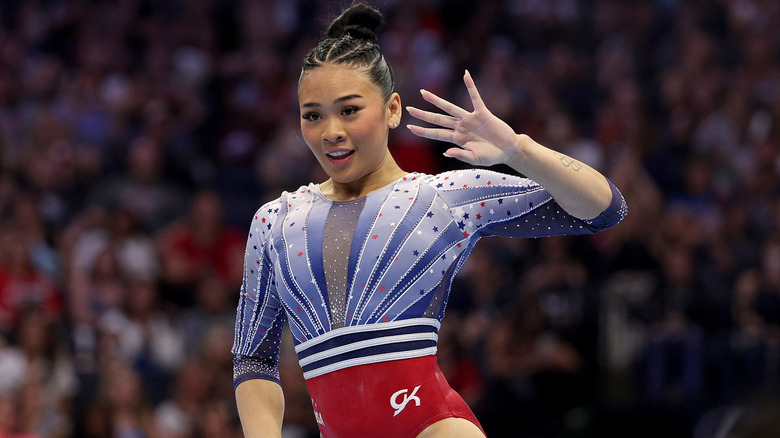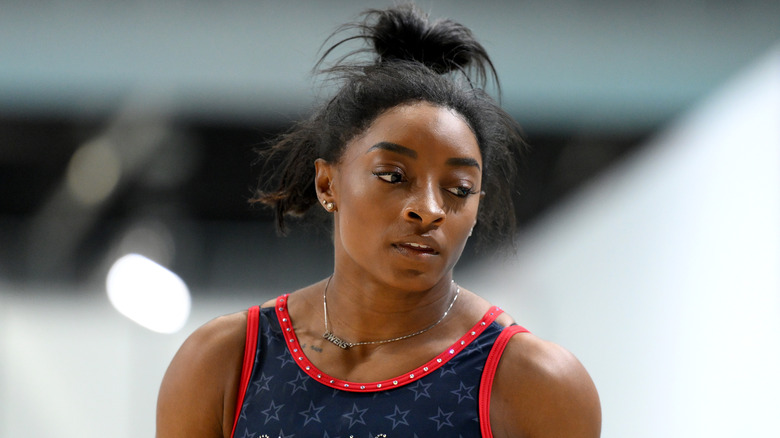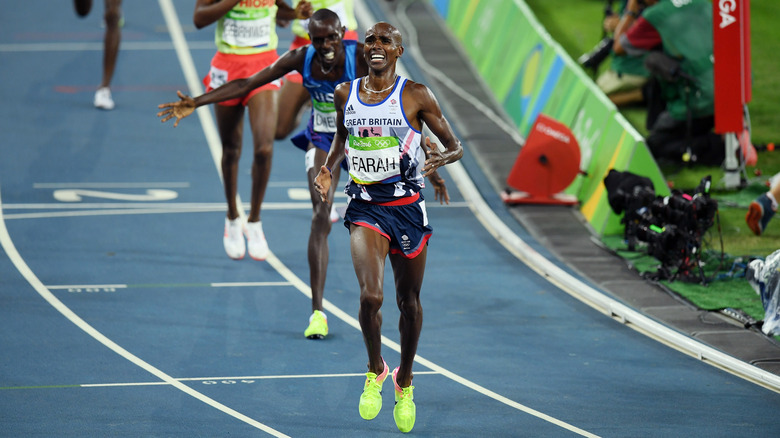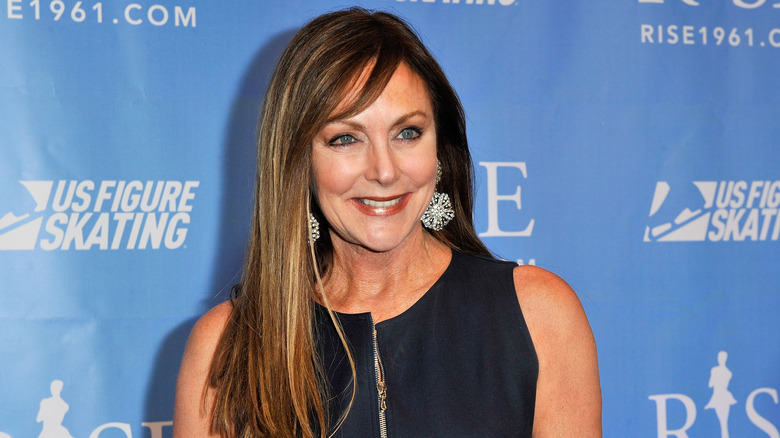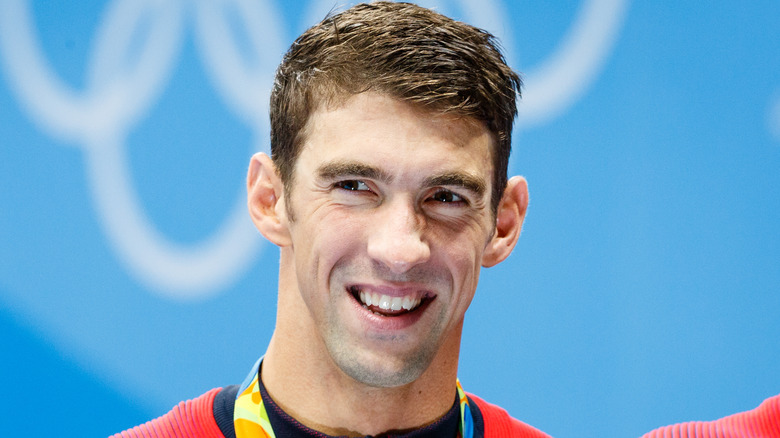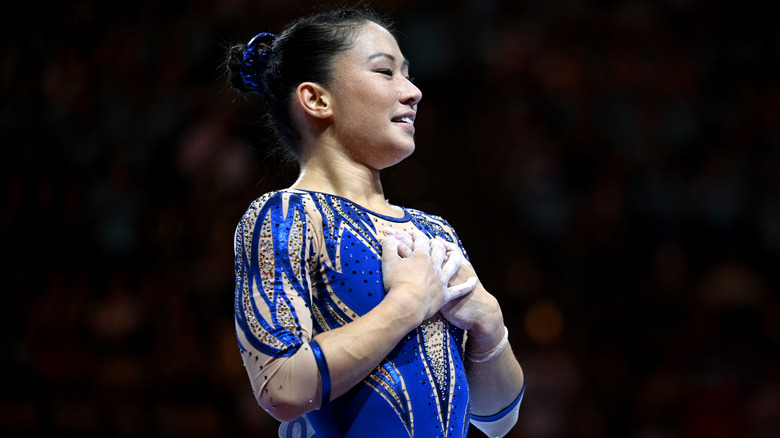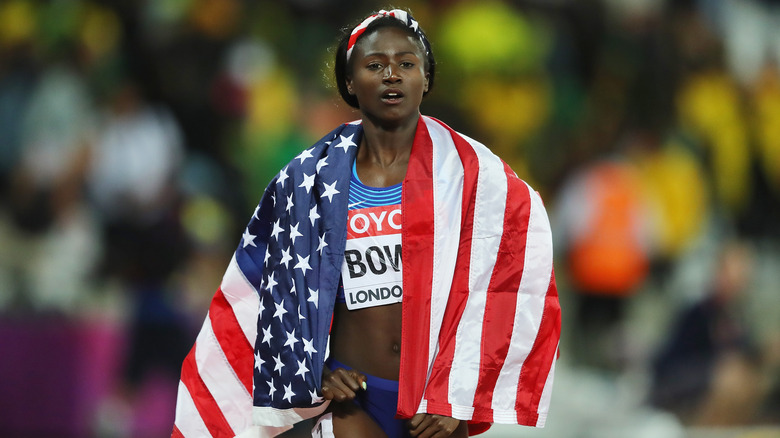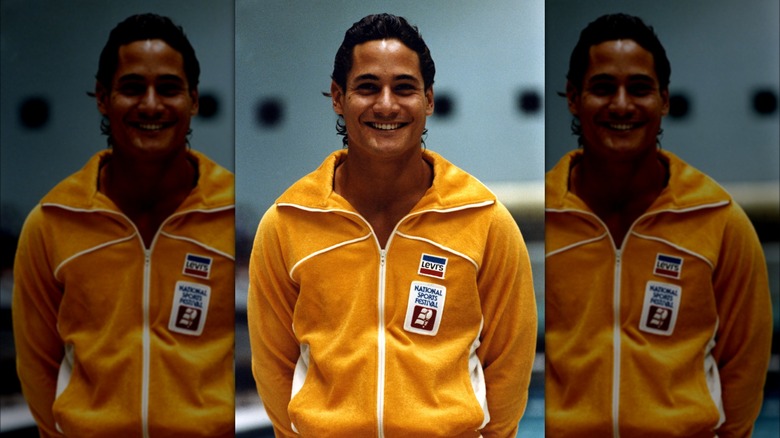Olympians Who Have Faced Major Health Battles
The following article mentions mental health struggles, suicidal thoughts, sexual abuse, and eating disorders.
Being an Olympian is no joke. From figure skaters pulling off gravity-defying moves to runners reaching speeds that seem impossible to swimmers racing great white sharks in their free time, there's a lot that goes into reaching that level. It's a masterclass in endurance, and that's before you take into account the mental impact and pressure that comes with the actual competition. Though it's easy to think these incredible sportspeople are infallible forces of nature, they're human, just like the rest of us.
Take Olympic gymnasts, for example. Beneath the glitz, glamor, and beaming smiles, some of the top contenders in the world have dealt with serious illnesses that have a dramatic impact on their health both on and off the floor. The biggest names in the sport, including Simone Biles and Aly Raisman, have been vocal about their struggles. Sure, they may seem invincible when they hit the uneven bars or execute a flawless floor routine, but at the end of the day, they are still mortal beings. Like all mortals, they are susceptible to malady.
Of course, gymnasts aren't the only athletes who experience significant health issues. A number of Olympians across sports have opened up about their own mental and physical well-being.
Suni Lee continued to compete after being diagnosed with kidney disease
Suni Lee almost quit gymnastics, but despite going through many different difficulties over the years, she's still here. Suni's father, John Lee, sustained a serious injury after he fell while trimming a tree in 2019. He was left him paralyzed from the waist down. The gymnast also faced her own health struggle years later when she was diagnosed with an incurable kidney disease. However, in 2024 she assured fans via Instagram that she wasn't letting the illness derail her participation in the Olympic Games that year.
"Getting diagnosed with kidney disease turned the world that I knew upside-down. At the time of my diagnosis, I was 20 years old, competing in a sport that I love so much," she told the American Kidney Fund. Suni, who partnered with the organization, went on to say that she hoped she would be able to encourage others to take charge of their own illnesses and strive to lead a full life.
When it comes to being an inspiration to young people everywhere, Suni has it down to a fine art. This gold medallist continues to persevere.
Simone Biles' mental health struggles saw her withdraw from the Olympics
Every now and then, an athlete comes along who is clearly on another level from an early age. The stunning transformation of Simone Biles is proof of just that. The talented U.S. gymnast first became a household name when she made her Olympics debut in 2016, going on to scoop four gold medals in the Rio event. She is largely considered the one to beat, even by her own teammates. However, things got a little complicated for Biles during the Tokyo Summer Olympics in 2021. In a candid interview with NBC's "Today" in 2021, the world-famous athlete explained that she was facing a mental block.
"I don't twist (on tour). I do double-lay half-outs, which is my signature move on the floor. That's never affected me. But everything else weighs so heavy, and I watch the girls do it, and it's not the same," she said. "I'm still scared to do gymnastics." She went on to reveal that her decision to withdraw from several events during the Olympics was a result of everything that she had been through, including long-term abuse at the hands of disgraced coach Larry Nassar.
"To do something that I've done forever and just not be able to do it because of everything I've gone through is really crazy because I love this sport so much," she said through tears.
Mo Farah collapsed in 2014
There are many tragic things you never knew about Olympic athletes, and over the years, it's likely more things will be revealed. Running sensation Mo Farah took the world by storm in the 2010s, making his Olympic debut in 2008 before winning two gold medals on home turf in London in 2012 and another two in Rio in 2016. Farah became a star not only because of his incredible natural talent but because of the adversity he overcame. As a child, Farah was trafficked illegally to the UK, where he was used as a domestic servant.
Farah went on to inspire millions with his story and remains a beloved athlete in Britain and beyond. However, two years before he scooped up gold again at the Rio Olympics, he had a health scare.
In 2014, Farah had to be airlifted to the hospital after he collapsed in his bathroom. The father of three recalled the incident at the time, speaking to the BBC. "I had a tooth taken out, and it got infected. I went for a run, came back, and collapsed," he said. "I was in so much pain from my stomach ... They thought something was going on with my heart." Fortunately, it was nothing as serious as a heart attack. After spending four days in the hospital and recovering from the infection, Farah was ready to get back to his training.
Aly Reisman has been hospitalized twice for stroke-like symptoms
Aly Raisman is without question an incredibly successful gymnast, having participated in two Olympic games and won a total of six medals. Alongside Simone Biles, she is one of the most recognizable faces in the sport in recent history, not least because she was one of the key figures who helped to bring down Larry Nassar when sexual abuse allegations came to light. Since retiring, Raisman has remained fairly active in the media, even appearing on a July 2024 episode of the popular podcast "Call Her Daddy" alongside host Alex Cooper.
On the episode, Raisman touched on the mental health issues she had been struggling with over the last few years. She detailed two hospitalizations where she found herself unable to remember things and or speak properly. "I can't remember my name. I'm slurring my words. I can barely speak. Both times, I was tested for a stroke because I literally couldn't move my body. It was so scary," she told Cooper. She said the experience was made even more terrifying because of the PTSD she still suffers from in the wake of Nassar's abuse, which led to a mistrust of medical professionals.
"People don't realize how much it still lives with you when you've been through something traumatic," Raisman said of PTSD.
Peggy Fleming was diagnosed with breast cancer
Back in the '60s, Peggy Fleming was one of the biggest stars in figure skating out there. She competed in the 1964 games, bringing home the gold medal. Later on in life, Fleming revealed that she had breast cancer. In 1998, she discovered a lump on her breast, just five months after she had a mammogram. Though it was a scary experience, she spoke about her recovery in an interview with the Los Angeles Times, saying that her mindset had a lot to do with it. "I think my life experiences really came into play. I wanted to win. I wanted to beat this," she said.
Thankfully, after undergoing an operation to remove the cancerous tissue, Fleming was cancer-free. She continued to advocate for breast cancer awareness, regularly using her platform to encourage other people to get tested. "I felt I really needed to share this," she told the Los Angeles Times. "I think it really helped me, and now I want to help others." Fleming also noted that catching it early made a big difference to how fast she was able to recover.
McKayla Maroney was diagnosed with histamine intolerance
McKayla Maroney was the star of one of the most awkward Olympic gymnastic moments ever caught on camera, thanks to the look she gave after taking second at the 2012 Olympics. The chances are that even if you don't know who Maroney is, you'll remember the photograph of her making a face that became famous worldwide. Though she no longer professionally competes, Maroney keeps her fans up to date by posting to her Instagram account, which boasts almost 30,000 followers. In October 2023, she posted a series of photographs of herself receiving hospital treatment.
"Hopefully, you had a hot girl summer because I definitely did not," she wrote. "I had a summer of severe insomnia. I slept a total of 10 days out of 3 months. I'd like to say it was a nightmare, but you have to sleep to have nightmares." Maroney explained that she went to multiple doctors and eventually discovered that she has a histamine intolerance. By cutting out high histamine foods and introducing supplements, she was able to balance it out and finally sleep again, but her struggles weren't totally over.
"I still have pretty bad anemia (low iron) I'm trying to get better from — and I found out high oxalate foods (like spinach, almonds, potatoes) give me massive fatigue ... that was also ruining my sleep," she went on, before expressing a desire to just "be normal." Maroney ended by saying that she hoped her openness about her ill-health might help someone else.
Michael Phelps struggles with depression and anxiety
There are many Olympic athletes who live insanely lavish lives, including legendary swimmer Michael Phelps. But just because he's an incredibly successful and financially comfortable person doesn't mean he's immune to personal struggles. On a 2018 episode of "Today," the superstar Olympian shared that he was no stranger to bad days. "Being an athlete, you're supposed to be strong and be able to push through anything. My struggles carried on through my career, and I hid them well," he said.
Phelps went on to say that as challenging as it was to deal with, he's made a point of addressing his mental health head-on. However, there was a time when that wasn't the case.
In the same interview, Phelps revealed that he was struggling so badly with his mental health in 2014 that he wouldn't leave the house and even considered suicide. "It was a really, really, really crazy time for me and I didn't want to see anybody. I saw myself as letting so many people down — and my, myself, in particular," he said. Thankfully, the Olympian eventually reached a point where he was ready to accept help, and that shifted things for the better. "I finally realized that I can ask for help and it's okay not to be okay," he said.
Kim Bui was diagnosed with bulimia
Sadly, it's not uncommon for female gymnasts to struggle with disordered eating. Due to the nature of the sport, keeping a lean figure is key to being able to move in the way that you need to, but it's important to be strong and healthy, too. Many contenders in the sport have spoken out about their issues with disorders, including Olympic gymnast Kim Bui. The German athlete retired in 2022 but went on to discuss her problems in an Instagram post in February 2023. "For many, this is a taboo subject," she wrote. "In the past, I suffered from an eating disorder — bulimia. I was athletic and thin but not so suspicious."
Bui detailed that she felt a lot of shame and guilt about her illness for years and found it difficult to talk openly about it until that point. She implored others to realize that they aren't alone while also taking aim at the sport: "Gymnastics is a sport where aesthetics are important, you wear figure-hugging leotards where every body proportion is emphasized, and it is still often characterized by a child-like body shape."
Her candid confession was a breath of fresh air, but it's hard not to be reminded of the late elite gymnast Christy Henrich. Henrich was just 22 when she died in 1994 from anorexia.
Tori Bowie died from complications following childbirth
Track and field Olympian Tori Bowie won three medals at the Rio 2016 games, scooping a gold, silver, and bronze medal for Team USA. She was in great physical condition and was eight months pregnant when she was found dead in her home in 2023. According to autopsy reports, her cause of death was eclampsia, a medical condition that impacts some pregnant women, causing seizures. She was 32 years old.
Bowie's daughter, named Ariana, was stillborn. "Her life was so much more than her death," NBC Sports analyst and champion Olympian Sanya Richards-Ross said to The Guardian. "She was an overcomer and a victor." Bowie's death, while entirely tragic and premature, called attention to disparities within the American healthcare system, especially with regards to Black women and maternal health. As seven-time gold medalist Allyson Felix wrote in Time, "Serena Williams had near-death complications during her pregnancy. Beyoncé developed preeclampsia. I hate that it takes Tori's situation to put this back on the map and to get people to pay attention to it. But oftentimes, we need that wake-up call."
A CDC report created in 2021 said that there was a 40% rise in maternal deaths in America that year; Black women are even more likely to come to harm.
Greg Louganis was diagnosed with HIV
Superstar diver Greg Louganis competed in three Olympics throughout his career, winning four gold medals and one silver. While competing in the Seoul Olympics in 1988, he hit his head on the board during the 3-meter springboard, causing him to bleed. He still won the gold.
In 1994, Louganis came out as gay. The next year, he told the public that he had been diagnosed with a few HIV months before the 1988 Olympics. While many rallied behind Louganis after he shared his diagnosis, there were others who had concerns about whether or not it was safe for him to compete (remember, this was the '90s). Louganis also had fears, especially after he cut his head on the board. "Even though I knew the chances of the virus spreading in a chlorinated pool are slim to none, the worst outcomes came to mind. Still, I kept my diagnosis a secret — I didn't think I had a choice," he told Vox in 2016. After he received his diagnosis, his doctor urged him to keep competing for the sake of his mental health.
While there was a point where Louganis didn't think he had long to live, he eventually found a treatment plan that worked for him. He continues to advocate for HIV/AIDS awareness and champion LGBTQIA+ causes. What's more, he's watched his sport become more accepting. "There is much more sensitivity, and people are much more open. Just look at how many athletes have come out now," he told ESPN in 2016.
If you or someone you know is struggling or in crisis, needs help with an eating disorder, needs help with mental health, or has been the victim of sexual assault, contact the relevant resources below:
- If you or someone you know is struggling or in crisis, help is available. Call or text 988 or chat 988lifeline.org
- Visit the National Eating Disorders Association website or contact NEDA's Live Helpline at 1-800-931-2237. You can also receive 24/7 Crisis Support via text (send NEDA to 741-741).
- Reach the Crisis Text Line by texting HOME to 741741, call the National Alliance on Mental Illness helpline at 1-800-950-NAMI (6264), or visit the National Institute of Mental Health website.
- Visit the Rape, Abuse & Incest National Network website or contact RAINN's National Helpline at 1-800-656-HOPE (4673).

